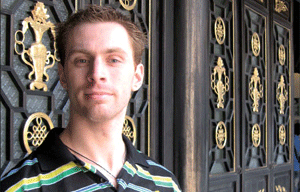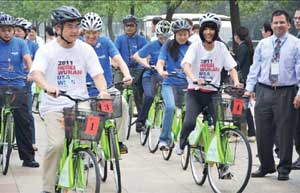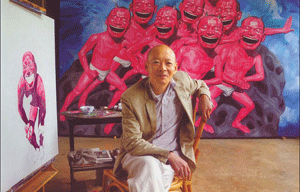A tale of two villages heralds a new era
Updated: 2011-10-17 08:22
By Zhu Zhou (China Daily)
|
|||||||||
 |
|
Sun Jianming of Taobei village glows with pride and contentedness in front of his three-story home. [Photos by Raymond Zhou / China Daily] |
Village chief Wang, who used to be a salesman, owns one of these factories. "Your fellow villagers look up to you for guidance. If you cannot make your own family business a good one, how can they trust you with the village business?"
Bamboo is a fast-growing perennial evergreen that covers the mountain behind Xiangxi. Bamboo shoots for food alone account for 333 hectares. "We achieved per-capita income of 10,300 yuan ($1,600) last year, and we're aiming for 11,000 yuan this year," said Wang, 53.
Luo Wenhua used to grow peaches but the trees suffered a quality decline after three years. Now he has shifted to bamboos, generating a yearly revenue of 325,000 yuan. "After deducting the expenses, I'm left with 220,000 yuan," said the 58-year-old, in a gentle voice.
Luo credits the village government with creating a better environment for his business. The paved roads - 18,000 sq m last year, 16,300 sq m this year - make it easier for buyers to visit and for goods to move out. It also hires agriculture experts to give free classes. "Some people depend on pesticides, but that is not good. I have gathered some experience, and the experts taught us more.
"The most money-making part is to grow bamboo shoots off-season, which can fetch a very good price," he added.
Luo is planning to buy a 360-sq-m house in a new development - for 350,000 yuan. That is a lot of room for one person, he laughs, as his wife is taking care of their grandchild in Suzhou where their son works for a multinational corporation.
The housing project, which has just broken ground, will accommodate 90 households in phase one, each occupying 185 sq m. But unlike Luo, each has to pay only an average of 30,000 yuan. This is made possible in a deal where the government buys the homestead of far-flung farmers and returns the land to farming; and the farmers buy the heavily subsidized housing built in higher concentration and with better use of resources such as power and water supply.
The key to success here: the homestead is not taken away from farmers, but converted from housing to farming that is still managed by farmers. That way, farmers have no fear of losing their livelihood (even though traditional farming, which is growing rice in this part of the country, has low economic value).
The massive funds needed for such projects - to the tune of 6.75 million yuan for each hectare of reclaimed farmland - comes from three levels of government: Hangzhou, Fuyang and Xindeng. (See jurisdiction chart.) Xiangxi is about 15 km from the town center of Xindeng, which, in turn, is roughly 60 km away from downtown Hangzhou.
What happens in Xiangxi or other villages in western Hangzhou may not fall into the tourist vista, yet it is part of the change that affects millions of ordinary people. The life portrayed in Dwelling in the Fuchun Mountains may surprisingly be available to more than a few scholar hermits.









